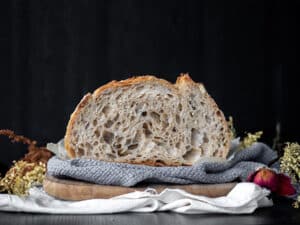Universally renowned as one and pre-mixed of the symbols of the French identity, the baguette is found in many countries of the world, sometimes in a slightly adapted form, but always adhering to the main principles that contribute to its success.
The baguette is recognisable by its long, narrow shape, a golden, crispy, shiny crust and its distinctive scoring, the baker’s signature. The crumb can vary according to the production method used. Baguettes are an excellent basis for sandwiches and the perfect answer to the current trends in snacking and nomadic lifestyles.
Each feature of the baguette must be scrutinised during the manufacturing process:
- the length: (traditionally 60 to 70 cm) this requires a sufficiently extensible dough to prevent tearing and shrinkage after shaping and to counteract volume defects (far more visible than in round loaves);
- the weight: the dough balls weigh around 330 g and therefore need to expand adequately to avoid customer dissatisfaction. Scoring the dough allows the crumb to expand, but the gluten network also needs to develop fully to be able to withstand the pressure from the steam created during baking and to prevent collapse during scoring. The choice of flour and appropriate mixing are key success factors in this respect;
- the development of aromas is influenced by the baking method (which help bring about the Maillard reactions required for the crust) and the type of process used: less intensive mixing and a long fermentation time will add warm and buttery cereal notes, combined with roasted hazelnut aromas in the crust;
- crustiness is a transient quality, since it is compromised by staling, or conversely, softening of the crust. The only solution is having freshly-baked baguettes available.
Lesaffre solutions for the baguette
Sourdoughs
- Starters: Microorganism cocktails adapted to baguettes with different levels of acidity.
- Live: Ready-to-use liquid sourdough based on rye or hard wheat, with moderate acidity and an active biomass.
- Devitalised: Devitalised sourdough on different substrates, in liquid or powder form and varying levels of acidity.
Improvers
- Traditional: Traditional improvers based on oxidants, reducers, emulsifiers and enzymes, whatever the process used (straight, retarded proofing, sourdough or frozen) help to obtain perfect baguettes in terms of volume and appearance. The usage doses are adapted to the needs of customers and/or the market.
- Free of emulsifiers and cysteine: The same functionalities (except for anti-blistering and anti-flaking), but with simplified labelling for the user. Also available in organic version.
- Water-soluble: Improvers with no water-soluble emulsifiers are easy to use in automated processes at very low doses.
Blends and pre-mixes
- Range adapted to market expectations in the form of a concentrated blend with yeast making it possible to produce different types of loaves with a varying level of rye content.




